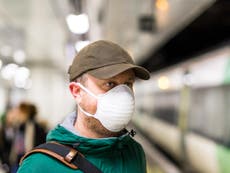I’m autistic. Trust me, being introverted isn’t a shield against the loneliness of social distancing
Extroverts aren’t the only ones struggling. Even people like me need to run their experiences by someone from time to time
If you’ve been active on Twitter recently, you’ve likely seen a plethora of jokes about introverts and the ease with which they will be able to self-isolate during the Covid-19 pandemic. For those who are instinctually averse to too much socialising, an extended period spent in isolation may seem like a blissful respite from the chaos of the outside world. However, from personal experience, I can tell you that far from being an oasis of calm and solitude, self-isolation in a confined space can devastate a person’s mental health to the point they may even struggle to recover.
During my third year of university, I decided to withdraw from all human contact and retreat into my dorm for a period exceeding six months. This wasn’t in response to a global viral pandemic but to the campus environment which, to an autistic person like me with a frequent need for solitude, had become unbearable. The noise, the crowds and the intensely social nature of university life all took their toll on me and, feeling unable to talk to anyone about my predicament, I put my life on hold and retreated into a private world away from prying eyes.
I ignored emails from lecturers asking me why I hadn’t attended class and even neglected to answer the door when a concerned friend popped around to check on my wellbeing. After just a few weeks, my shoebox-sized room in inner-Nottingham became a festering landfill site of empty lemonade bottles, pizza boxes, uncleansed plates and chocolate wrappers.
Without a routine, I’d developed a nocturnal sleep pattern as though I were existing in a parallel time zone to the world outside where life carried on as normal and people remained totally oblivious to my predicament. When the public got up for work and the rush hour began, I was just going to sleep, my mind unrested from the hours of YouTube I’d been binge-watching the night before. A steady diet of junk food made me fat and listless, while a lack of conversation was driving me to near-insanity.
Life without outside contact, aside from the brief phone call I had with my parents once a week, devastated my mental health to such an extent that I haven’t recovered to this day. No exercise, no intellectual stimulation and, most vitally, no human contact contributed to me developing clinical depression and an eventual panic disorder which, nine years later, I’m still afflicted by.
Though the circumstances of my self-imposed isolation were somewhat different to those faced by many now, the same dangers of seclusion apply. Humans are social creatures for whom interaction is not only enjoyable but also a requirement. Even the most introverted people like me need to run their narrative by someone from time to time. To be deprived of such a basic need for months on end is damaging and can lead to an exacerbation of pre-existing physical and mental health problems.
At this time, our chief concern should be with our elderly relatives, many of whom will be alone in their homes for the foreseeable future. Though it might be unwise to come into contact with them physically, it is imperative for their sake that we don’t neglect them. Regular phone calls can make the world of difference to someone at a low ebb and can even be the difference between someone living or dying. I should know.
Six months into my isolation, I had descended so far into despair that I was prepared to end it all. I’d researched almost every method there was for terminating my own suffering and, were it not for one random kind gesture, I likely would have carried one of them out.
As if by divine intervention, a psychologist from the university’s counselling team called me up out of the blue. I’d been in touch with the service in my first year but had since lost all contact. Having been alerted to my absences by my tutor, she got in touch and asked about me how I was doing in a gentle, non-judgmental way.
Simply having someone pick up the phone made all the difference. The fact she had thought of me and showed a genuine concern for my well-being gave me a psychological boost that enabled me to banish all thoughts of suicide and lift myself out of my pit of despair. Before long, I’d left my room and returned, albeit tentatively back to real life. Naturally, I had to repeat the academic year, but at least I was alive.
If you know anyone who is isolated, please get in touch and ask them how they’re doing. Listen to them, for hours if necessary, and always bear in mind how vulnerable we all are against life’s vicissitudes.
Tom Clements is an autism advocate and author from Essex. You can find him on Twitter @tclementsuk





Join our commenting forum
Join thought-provoking conversations, follow other Independent readers and see their replies